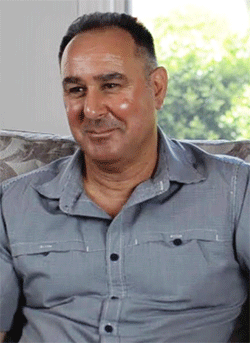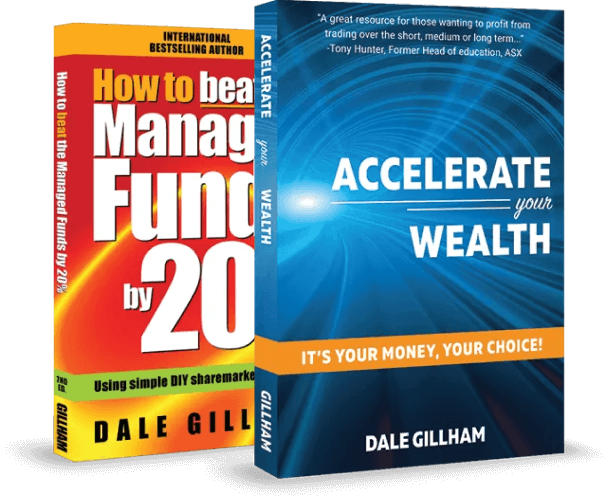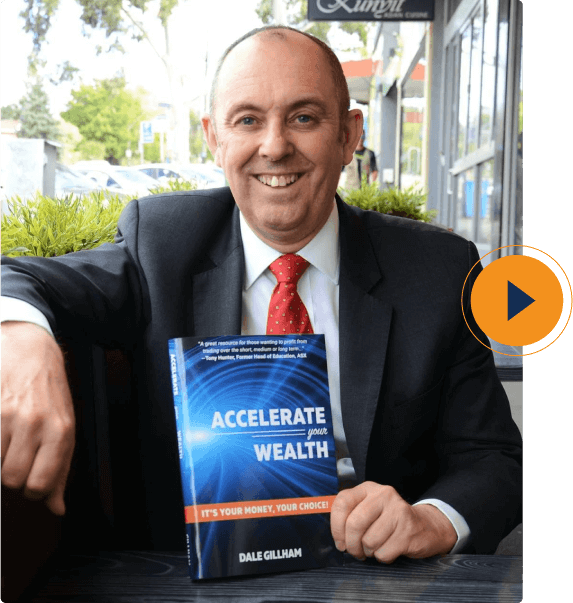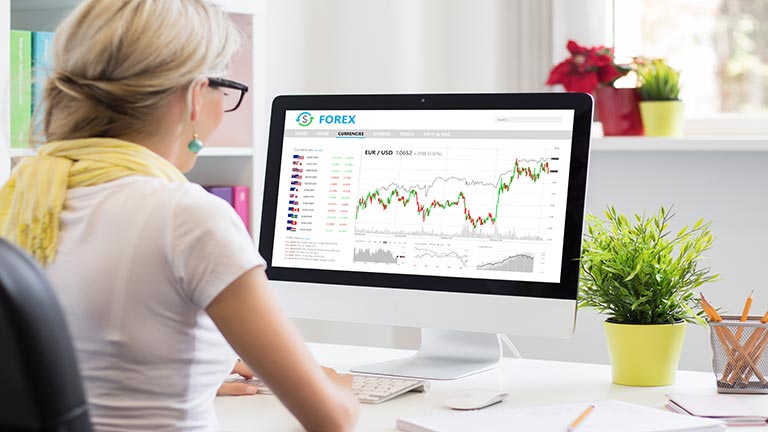Wealth Within Case Studies
Shane Feneck
Shane Feneck shares a review of his experience before and after completing the Diploma of Share Trading and Investment with Wealth Within.
Originally from Sydney, Shane left school at Year 10, which was the norm in those days. After a near fatal accident, Shane realised he was getting older and needed a way of making income that didn't involve physical work. Trading the markets had always been an interest of his, so Shane decided to make this a reality.

How and when did you first become interested in the markets?
Wow! I don’t know if my memory is that good! It might sound crazy, but I started before trading was even available on computers. So, you could say twenty or more years ago.
And then what happened?
Back then, I was reading ads in newspapers and magazines in search of education providers, however, the choice was limited to a few and it was very difficult to validate whether they were credible or if the education would provide the outcome I was seeking. It was also impossible to determine whether the education was good value for money. I applied for information either via post or by phone.
One thing I have learnt along the way is, when you pay for education, you cannot really determine the value of a good course, as you would, say a car before you buy it. I’ve learned that quality education appreciates in value and is a life skill that I can continue to improve on and generate an income from when used correctly throughout my life, whereas, in most cases, a car depreciates in value, if that makes sense.
How have you been able to learn and educate yourself about the markets?
After many years of wasted time and lots of money purchasing trading software and courses that promised a lot and delivered little, I eventually decided that if I am going to learn how to trade properly, like a professional, I need to approach this in the same way I would undertake a recognised qualification as an accountant, lawyer or engineer. What that meant for me was to find a quality education that is government accredited and nationally recognised. I couldn’t afford to waste any more time or money and I wanted to ensure this time around that the education I invest in would provide the outcomes I was seeking to become a trader. I wanted professional support and a structured learning process and the right learning environment that would allow me to get the most from the information, so I enrolled in the Diploma of Share Trading and Investment at Wealth Within.
This gave me the peace of mind, knowing I was studying a course that has been validated to provide the knowledge and skills outlined in the curriculum. For me, this was like a guarantee that I had chosen the right learning pathway.
Did you make mistakes when first starting out?
Absolutely, and more than once. We all make mistakes along our journey. To put it in perspective, I researched some of the wealthiest people around the world, and found they had all made many mistakes and some had gone bankrupt before they achieved success. There is a saying, ‘if you don’t make mistakes, you are not learning’. It’s the acknowledgement of your mistakes that helps you grow and learn. This is so true when learning to trade.
Would you define yourself as a discretionary trader, a mechanical trader or a combination of both?
Right now, I’m more of a mechanical trader. However, I will always stay open-minded and assess each trade based on the analysis and the result of my back testing. I test each strategy to determine the rules with the highest probability of success and confirm the strategy I will outline and use in my trading plan. That way I trade on confirmation and confidence.
Who have been some of your mentors and role models? What impact have these people made on you personally as well as on your trading style?
Of course, the great Warren Buffett, who is undeniably the greatest investor of our time, Dale Gillham, co-founder and Chief Analyst of Wealth Within and Janine Cox, Senior Analyst at Wealth Within. I found that Dale’s simplistic approach to trading resonated with me. He made understanding trading easier by demystifying the complicated and confusing jargon that corporate financial institutions use. I found Janine’s detail to the structure and process of trading and goal setting very helpful, as that is something I have always lacked.
Can you give us a brief overview of your trading style?
I am a mechanical trader and I have been trading more medium to long-term up until now. However, I am now more focused on short-term trading to increase my capital and then use CFDs (Contracts for Difference) to leverage my capital and returns to grow my portfolio.
Is there any one trade (win or loss) that had a profound effect on your development as a trader? If so, what did you learn from the trade?
A friend of mine recommended a broker that they had been using, so I decided to give him a go and the first stock I bought was Nextel, which tripled my capital and that was great. So, he suggested Maxotech, and I bought some of those, given I profited on Nextel. Unfortunately, Maxotech was not as good of a buy as advised and I lost all my capital, as the company eventually ceased trading and I didn’t know why.
However, the biggest loss I incurred was from a financial adviser who was a friend and I put my faith in his expertise and invested money in two managed funds. I gave him control of my AMP shares that I had accumulated over many years. Some I bought for a $1 or so over time and some I received for free from AMP. In 2004, after a 12-month recovery from a near-fatal truck accident, I decided to sell up everything and go travelling overseas, which meant I would liquidate my AMP shares and managed funds.
Prior to that AMP had reached $20.80 a share, which I was so excited about given the return I had gained and told my adviser to sell AMP, which he recommended not to, as they were in merger talks with Henderson Global. At the time I replied ‘I don’t care, I am happy with what I have gained’. But having no experience in the market, I agreed to hold off on the sale, only to find that the AMP share price had some time later plummeted to less than $3. I was devastated and called him, furious about the loss. He replied, ‘it’ll be okay, they will recover’. I said AMP won’t recover that high before I leave to go travelling or anytime soon. So, I instructed him to cancel everything I had with him and cease any business.
What I learnt from this experience was that, there is a lot of money to be made from the share market, however, there are two key points that really hit home for me and they are:
- No one else, not brokers or advisers, have the emotional connection to my money that I do. They profit regardless of whether you win or lose.
- If I had this education back then and the knowledge and understanding I have now in how to read the market, analyse it and trade it, I would have been able to make a more educated decision that would have allowed me to control and manage the outcome and avoid the loss.
So, I can share from personal experience that whatever you choose to do, remember, get the right education the first time around and avoid costly mistakes, because we end up paying for our education one way or another. Either, by investing in our self-education in the form of tuition fees or the losses we incur in the market.
Can you tell us about your best and worst trades?
A gas stock I bought with a friend became my best and worst trade, all in one. Funny how things happen, we believed it would return a great profit due to a potential takeover bid several times higher than where we bought in at.
I decided to take a trade in this stock without using any analysis or skills taught in the Diploma of Share Trading and Investment. I didn’t do any back testing or any analysis at all. I broke all of the rules and just focused on the money. Well that was a silly mistake. I bought it at $0.132 and at one stage it fell to $0.049, so I was sitting on a big loss of around $14,000 or nearly 70 percent of my capital. This really affected my trading psychology.
Also, the capital I had invested was the biggest amount I had placed into any trade, but I decided to hang in there with a bit of help from my mentor Dale Gillham, before applying some analysis to navigate a few volatile weeks as the price began to climb back into profit. This allowed me to confirm an exit strategy, using rules, to sell a parcel of my position to the value of the capital I had initially invested, which was a happy day. I then kept trading with the remaining profit as the stock price continued to strengthen and then I sold the balance of those shares at $0.295, which allowed me to just about double my return, with a handsome profit, thank goodness!
Would you classify yourself as a short-term or a long-term trader? What advice would you offer to people getting started as traders on the relative merits or otherwise of each?
Up until recently, I have been more of a medium-term trader. Trading is a personal journey, therefore the way I want to trade may not suit the intended trading style and timing of another person, because of their personal or family situation or financial goals.
It’s about being prepared to dedicate the time, effort and investment in the right education, not just any education, you want to know that it is quality education that can be validated, otherwise how will you know that it works?
It’s also about having the right attitude and determination to learn. And sure, you will face challenges along the way as I found working full-time- for six and sometime seven days a week. I learnt that “it’s not where you start that is as important as where you end up”.
What markets do you trade, and which markets do you prefer? Do you have a favourite, and why?
Right now, I am only focused on the Australian Equities Market as I feel it is important to master my craft properly first before venturing into other ones. I want to keep my trading simple, so I can enjoy my time doing the things that are more important to me.
As they say at Wealth Within, trading is about creating a lifestyle, not making it your lifestyle.
What makes your trading style different from others? What sets you apart from other traders?
I guess that’s a hard one to answer as I don’t know how others trade, unless they’ve studied the same course. The only thing I can say, given the statistics is that only 10 percent of traders make money and most people make decisions based on fear and greed, which means they sell too early or too late. I use a disciplined and structured approach that allows me to see the big picture and I can interpret the important signals and changes that affect price movements. The benefit is that it allows me to adjust my trading rules to provide an appropriate response to market conditions and achieve consistent profitable results.
Do you have a favourite trading rule?
That’s a difficult one to answer as there is not one rule that fits all stocks. Because, you must treat every stock individually to determine what rules are likely to work best. So, if I must answer this question, I would simply say my favourite rule is the one that works best for the stock I am trading at the time and provides the result I’m looking for.
Ed Seykota says, “Everybody gets what they want from the markets.” What do you ‘get’ from the markets?
The market gives me control over my financial decisions, self-reliance and the satisfaction of knowing that no matter what happens in the future, I have a life skill that allows me to generate an income no matter where I am or where I live. Simply, it gives me back the time and financial independence that everyone strives for.
How has trading affected your lifestyle?
Well, I have recently made a lifestyle change from living in Melbourne to the beautiful warm weather and beaches of the Sunshine Coast, where I will now be self-employed with flexible working hours, which will allow me the luxury of balancing contract work with the valuable time to spend developing my trading side of the business, to achieve the financial independence and outcomes I seek.
What books, seminars and courses have you read or attended, and which would you recommend?
I first read “How to Beat the Managed Funds by 20%” by Dale Gillham. I related to what he wrote due to the fact he simplified what trading is and how people need to approach it. The richest man in Babylon by Napoleon Hill. I also really enjoyed Dale’s new book “Accelerate your Wealth - It’s Your Money, Your Choice!” — it’s definitely worth reading. The title says it all. Regarding seminars that I attended prior to studying with Wealth Within, if I can be honest, I’m not a big fan of them as you cannot learn to trade from a seminar, over a weekend or a week, not to mention, there is always the hard sell at the end. So, there are no actual seminars I would recommend to anyone, the only recommendation I do have is to choose a quality education.
What does the future hold for you?
I now get an opportunity to trade lifestyles and create the financial independence that got me excited and started into trading. The move to the Sunshine Coast is just the first step of my journey to trade lifestyles and I’m excited about the next steps I will take towards reaching my financial and lifestyle goals.
Insights From Our Learning Centre


Learn the concepts as to how you can accelerate your wealth using simple DIY investment strategies that will enable you to take control of your investments. Dale Gillham, bestselling author, shows you how to invest with confidence to achieve very profitable returns.
Browse BooksOr Browse By Topic
5 Stars
Years in business delivering high-quality education
of students rate the quality of education as excellent or very good
of students recommend Wealth Within



